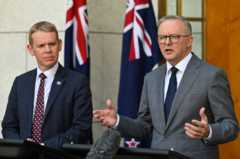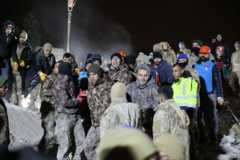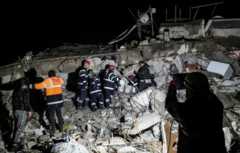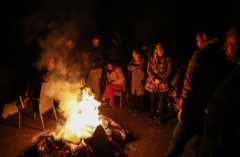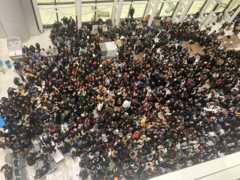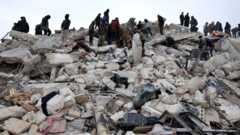Report by BBC
Summary
Istanbul sends 13,000 rescue personnel to quake zone
Istanbul has dispatched about 13,000 rescue personnel to the earthquake zone early Tuesday morning, said Governor Ali Yerlikaya.
The team comprises staff and volunteers, and were sent particularly to the Hatay province.
Hatay has suffered devastating damage from Monday’s earthquake – which also split the runway at Hatay Airport into two.
- A rescue operation is under way across much of southern Turkey and northern Syria following a huge earthquake that has killed more than 4,300 people
- The 7.8 magnitude quake struck near Gaziantep in the early hours of Monday while people were asleep
- A 7.5-magnitude tremor then hit at around 13:30 local time (10:30 GMT), which officials said was “not an aftershock”
- The country’s disaster agency says more than 2,900 people were killed in Turkey alone after the first quake, and more than 15,000 were injured
- More than 1,400 people are reported to have died in Syria
- Rescuers are racing to save people trapped beneath the rubble after thousands of buildings collapsed in both countries
- Countries including the US and South Korea are sending aid after Turkey issued an international appeal for help
It’s a race against time, says medical and disaster expert
Rescuers are racing against the clock with several factors in their way now, a critical care expert said.
The lack of water and oxygen are critical barriers to survival, said Dr Richard Edward Moon of Duke University.
Each adult loses up to 1.2 litres of water daily.
“That’s urine, exhale, water vapour and perspiration if there is any. At the point where eight or so litres has been lost, that’s when a person becomes critically ill,” said Dr Moon, who was speaking on BBC Newsday.
Furthermore, it is winter now in Turkey and Syria.
An average adult can tolerate temperatures as low as about 21C indefinitely. But when it gets colder, the body loses its ability to maintain heat.
“At that point, the body temperature essentially follows the temperature of the environment. And the rate at which that may occur would depend on the insulation that the person may have, or how much shelter underground they may have. But ultimately, many of these unfortunate people may succumb to hypothermia,” Dr Moon said.
“My heart goes out to those who are trapped, and also to the workers who are doing the best to get them out of trouble.”
-
Emergency supplies from Iran and Iraq arrive in Syria
Aid planes from Iran and Iraq have arrived at Damascus International Airport.
The Iraqi planes carried about 70 tons of food, medical supplies and blankets, among other emergency supplies, Syrian state media SANA reported. These were delivered early Tuesday morning.
Iraqi’s Prime Minister Mohammed Shia al-Sudani said on Monday they would send an aid shipment supplying first aid, shelter supplies, medicine and fuel.
Iranian aid arrived earlier on Monday. Iran’s Foreign Minister Hossein Amirabdollahian had said on Monday that his country is ready to dispatch humanitarian aid to quake-hit areas in Syria.
Video content
Video caption: Turkey-Syria earthquake: Iranian aid lands in Syria -
Rescue teams battle traffic to reach epicentre

Anna Foster
Reporting from Osmaniye, Turkey
As dawn breaks we’re heading for Maras, close to the epicentre of the quake and believed to be one of the worst-affected areas.
Traffic on the main highway is at a standstill, occasionally crawling forward, the wet road illuminated by glowing red brake lights.
Few people have made it to this part of southern Turkey yet, and everyone’s trying to get there as fast as they can to assess the damage and give vital help.
I just met a search and rescue team on their way to the city, their van loaded with specialist equipment and supplies.
They’re eager to get there and start looking for survivors, but they have no idea how bad the devastation will be when they arrive.
-
New strong quake reported in central Turkey
A new strong earthquake is now reported in central Turkey.
The US Geological Survey says a 5.5 magnitude tremor was at a depth of 10km (6 miles) near the town of Golbasi.
Meanwhile, the France-based European-Mediterranean Seismological Centre (EMSC) put the strength of the quake near Golbasi at 5.6, adding that it was at a depth of 2km.
Both agencies said the tremor happened at 03:13 GMT on Tuesday. They provided no further details.
South-eastern Turkey has been rocked by a series of aftershocks since the deadly earthquake near the city of Gaziantep on Monday morning.
-
Japan sends disaster relief team to Turkey
Japan has sent a disaster relief rescue team to support search and rescue efforts in Turkey. The team departed for Turkey on Monday night.
Japan’s Ministry of Foreign Affairs said in a press release on Monday: “Upon the request of the Government of Turkey, and in light of humanitarian perspective and Japan’s friendship relations with Turkey, Japan has decided to provide this emergency assistance to Turkey to meet its humanitarian needs.”
 Copyright: Reuters
Copyright: ReutersImage caption: File photo of Japanese foreign minister Yoshimasa Hayashi -
Volunteers warned not to drive to quake zones
Red Crescent President Kerem Kınık warned people not to drive their cars to earthquake zones to donate relief supplies.
“Vehicles fell on 50-meter fault fracture on the roads. There is snow and ice on the roads,” he said.
He asked people to instead donate food and supplies such as blankets, coats and boots to Red Crescent, which will distribute them, instead.
The group is also calling for blood donations, to help save the wounded.
-
Australia to give A$10m in aid
Australian Prime Minister Anthony Albanese on Tuesday said his government would provide an “initial” 10m Australian dollars ($6.94m; £5.76m) in aid, to go to humanitarian groups.
“Australia’s assistance will target those in greatest need,” he said, expressing his condolences to those affected.
New Zealand’s Prime Minister Chris Hipkins, who is visiting Australia, also announced his government would chip in 1.5m New Zealand dollars ($0.94m; £0.79m) in aid.
 Copyright: Getty Images
Copyright: Getty Images -
How are earthquakes measured?

Pallab Ghosh
Science correspondent, BBC News
They are measured on a scale called the moment magnitude scale.
A tremor of 2.5 or less usually cannot be felt, but can be detected by instruments. Quakes of up to five are felt and cause minor damage.
The Turkish earthquake at 7.8 is classified as major and usually causes serious damage, as it has in this instance.
Anything above eight causes catastrophic damage and can totally destroy communities at its centre.
-
South Korea to send rescuers and medics to Turkey
South Korea is the latest country to offer its assistance to Turkey.
On Tuesday morning, President Yoon Suk-yeol issued an order to send rescuers and emergency medical items to the country.
“Yoon ordered related government agencies… to come up with additional support measures in case needed by Turkey,” a statement said.
-
Syrians take refuge in convent
Syrians gathered at a convent in Aleppo to spend the night as they feared more tremors following the deadly earthquake that hit on Monday.
One woman said she’d fled to the convent because it was in a remote area, free of tall buildings.
Video content
Video caption: Turkey-Syria earthquake: ‘This convent provides the most important thing – safety.’ -
‘They’re calling out – but we can’t save them’
 Copyright: Getty Images
Copyright: Getty ImagesFreezing temperatures, snow and rain have hampered search efforts for survivors through the night in Turkey, as those trapped in the debris cry out for help.
One man in Hatay, a province in Turkey’s south, wept in the rain as he described to Reuters the agonising wait for rescuers.
“They’re making noises but nobody is coming,” Deniz said, at times wringing his hands in despair.
“We’re devastated. My God… They’re calling out. They’re saying, ‘Save us,’ but we can’t save them…. There has been nobody since the morning.”
Meanwhile, in Syria, Raed al-Saleh of the White Helmets – a rescue service in rebel-held territory – said they were in “a race against time to save the lives of those under the rubble”.
-
BREAKINGQuake death toll in Turkey rises to 2,921
The confirmed death toll in Turkey has now risen to 2,921, says the head of the country’s disaster and emergencies agency.
Yunus Sezer adds that another 15,834 people have been injured.
-
WATCH: Drone footage shows aftermath
New drone footage shows the massive destruction in Turkey’s border province of Hatay.
Plumes of smoke can be seen billowing from flattened buildings as rescue workers climb over collapsed structures looking for survivors.
Video content
Video caption: Turkey and Syria earthquake: Drone footage shows Turkey earthquake aftermath -
The latest from Turkey and Syria – key developments
 Copyright: EPA
Copyright: EPAIf you’re just joining us – here’s the latest:
- Night has fallen in Turkey and Syria – but a massive search and rescue operation continues across a vast area stretching from south-eastern Turkey to northern Syria
- The confirmed death toll in the two countries now stands at more than 3,500, but that’s expected to rise. As many as 15,000 people have been injured
- Rescue teams from around the world are urgently being deployed to help find those still trapped under the rubble, as the next few hours will be critical for their survival
- A number of people whose apartments were destroyed are spending the night on the streets in nearly freezing temperatures. Some have gathered near campfires to keep warm
- Thousands of buildings have collapsed after the 7.8 magnitude quake near Gaziantep, Turkey, hit in the early hours of Monday while people were asleep
- A 7.5-magnitude tremor then hit nearby several hours later, causing further damage to a region that was already badly shaken
 Copyright: EPA
Copyright: EPA -
Hundreds crowd area of Istanbul airport
Alice Cuddy
Reporting from Istanbul
 Copyright: BBC
Copyright: BBCHere at Istanbul airport hundreds of people are gathered in one small area.
Onlookers told us the people had come here to volunteer to help with the earthquake response, with many presumably wanting to travel onwards to the most badly hit areas of the country.
The BBC has been unable to verify if everyone pictured is hoping to volunteer, but the scale of the crowds is certainly unusual.
-
Two US rescue units to go to Turkey – ambassador
More now on the US pledge to assist the ongoing search and rescue operation in Turkey.
The US Ambassador to Turkey, Jeff Flake, said two units would be deployed.
“One from Fairfax County [Virginia] and another from Los Angeles – what they call these heavy units, each with, I think, 70 personnel with search dogs as well as paramedics,” Flake told CNN.
“That’s what we are told is needed.”
The ambassador added: “Look at the scope of devastation. It’s daunting.”
He said that in the coming weeks a key challenge would also be to “find housing for those who cannot go back in their apartment buildings.”
-
US teams deploying quickly to help rescue efforts – Biden
US President Joe Biden spoke earlier to his Turkish counterpart Recep Tayyip Erdogan, reaffirming “the readiness of the United States to provide any and all needed assistance”.
In a statement, the White House said Biden “noted that US teams are deploying quickly to support Turkish search and rescue efforts and co-ordinate other assistance that may be required by people affected by the earthquakes, including health services or basic relief items”.
It provided no further details about when and how many US rescuers would be deployed to the country.
-
I’m caring for 40 critically ill patients – Syrian doctor
 Copyright: Getty Images
Copyright: Getty ImagesImage caption: Rescuers are searching for victims and survivors in the rubble of collapsed buildings in Syria British-born Shajul Islam has worked in the intensive care unit of al-Shifa Hospital in Idlib in northern Syria for the past seven years.
He described what it’s been like working in one of the region’s largest medical facilities following the earthquake.
“When I tell you this is the worst I’ve ever seen, I literally mean that,” he told BBC Radio 4’s The World Tonight programme.
“Our hospital is full. We have about 300-400 patients in the hospital right now… we literally have two to three patients per bed.”
He says there aren’t enough staff to look after patients and he’s caring for 40-45 critically ill patients in the ICU, adding “I can’t do that by myself, It’s impossible”.
He says medical staff have always made these types of difficult decisions but “never to this extent”.
Quote Message: I’m taking patients off ventilators to give them to other patients that might have more of a chance of surviving. We’re literally at the entrance of the hospital deciding which patients we are going to try to save. And which patients we’re not even going to make an attempt to save. from Shajul Islam Doctor -
BREAKINGDeath toll now more than 3,500
At least 2,379 people were killed and 14,483 were injured in Turkey following the earthquakes, the country’s vice-president says.
Fuat Otkay adds that 7,840 people were pulled alive from the rubble after 4,748 buildings were destroyed.
At least 1,444 people are reported to have died in Syria.
It means the death toll from the devastating earthquakes now stands at more than 3,500, but this is almost certain to rise as the rescue efforts continue.
The World Health Organization (WHO) earlier warned that the death toll could eventually rise eight-fold.




